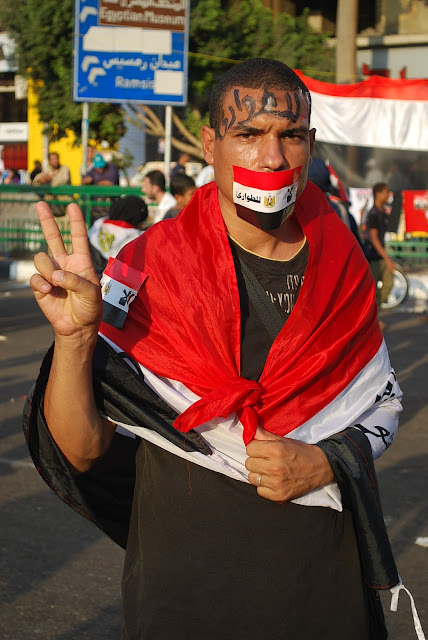Like every Egyptian, I didn't believe Mubarak's trial would actually take place.
I arrived at the Police Academy, where the trial was being held, at around 8.45 a.m. on August 3rd. I didn't have a permit to go into the court, but instead I found myself among countless other international media outlets, following proceedings on a large screen.
The question on my mind: Was Mubarak really going to be trialled?
It was only until we saw his helicopter arrive, of which I got a long shot, that it seemed I was about to witness an unforgettable moment in Egypt's post Jan 25 history.
Seeing Mubarak lying on a hospital stretcher, in a cage along with his two sons Alaa and Gamal, the former Interior Minister Habib El Adly and a few other accused, seemed surreal. The trial seemed like a play set in a Greek arena. Many Egyptians commented on the theatricality of it all. I was waiting for vegetables to be hurled at the cage.
Seeing Mubarak on a stretcher aroused my sympathy. I felt the process did't show humanity, if it required the disposed president to be wheeled in on a stretcher. I'm 100% for this trial, but I feel it needs to be handled humanely, regardless of 30 years of inhumanity under Mubarak.
Post Jan 25 should espouse universal human rights regardless who is on trial. A friend later remarked that the stretcher was probably part of an act to arouse people's sympathy. Maybe I was manipulated by the conditions surrounding the trial, but that did not change my opinion that Mubarak should be tried.
On a philosophical level, aside from all of his crimes, as I said before, Mubarak robbed millions of their right to dream.
I talked to some of the mothers' of martyrs, a heart breaking experience. At one point, I felt like I was crossing the line into a very private moment, thanks to my camera.
At another point, stones were thrown at us from somewhere. Things just blew up in an instance. People started running to the other side of the road, taking shelter until the attack had ended. Someone claimed the stones were being thrown at us from inside the Police Academy. But I wasn't sure if this was true. The commotion had started so suddenly, it was hard to trace it back to its source.
Pro Mubarak supporters were sitting in an area that was cordoned off. I managed to interview two supporters and it seemed like a psychedelic experience. An Egyptian producer later told me, they were most likely paid supporters, which judging by what they said, seemed very feasible.
I was conducting an interview with someone, when the crowd flared up again. This time it seemed more serious. Apparently Pro Mubarak supporters and Mubarak opponents were fighting. Stones flying in the air. Again I couldn't determine how it all happened, as things ignited in less than a minute.
I ran to a sheltered area filming some of what was going on and I watched, from a distance, riot police move in to disperse the fighting crowd. Things calmed down eventually.
I decided to go home at that point. Job done. Another eventful day on this journey.
Next act: August 15th.
































